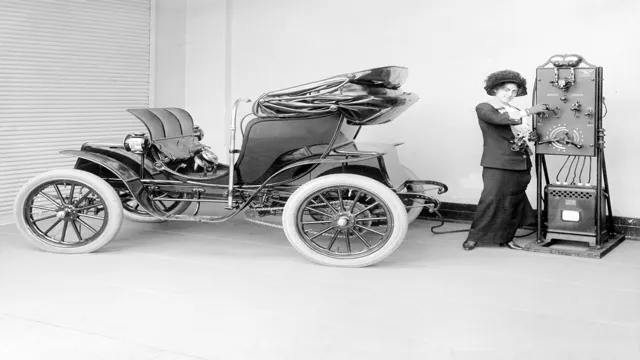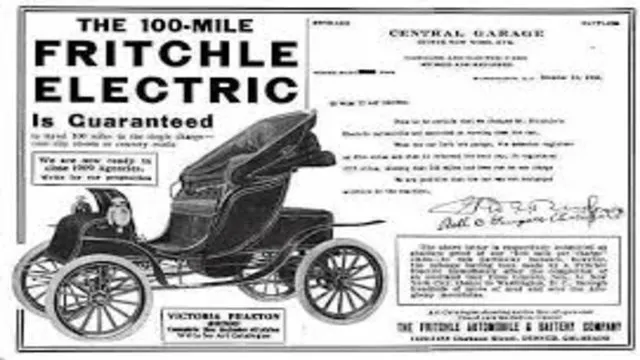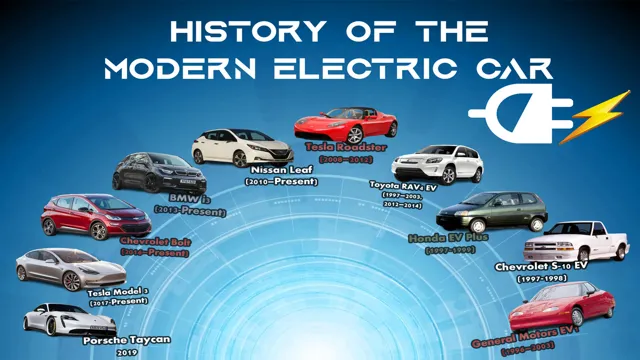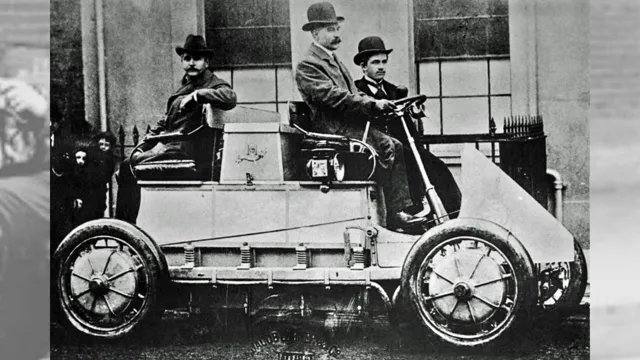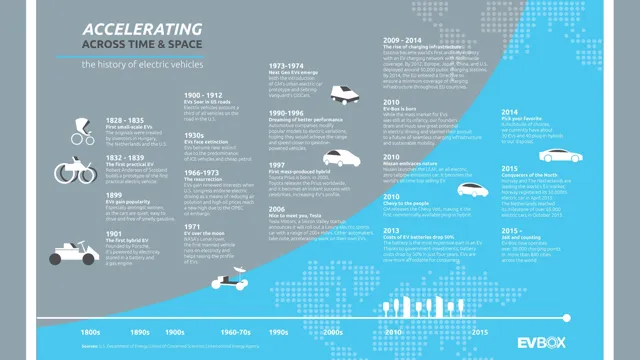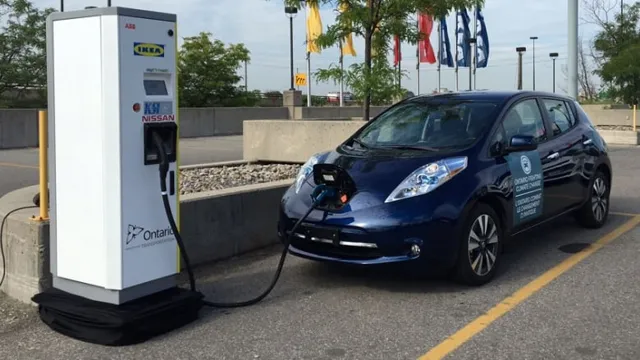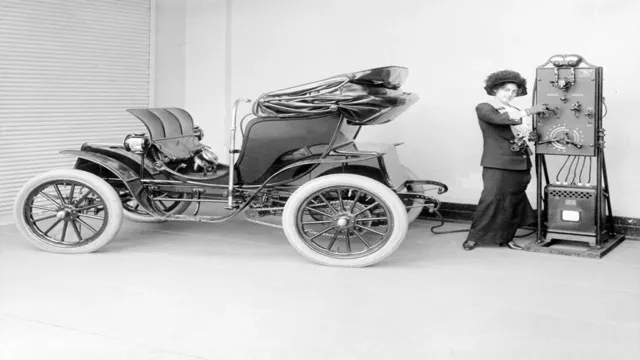Powering the Future: Tracing the Fascinating History of Modern Electric Cars
Electric cars have come a long way since the first crude prototypes hit the road in the 1830s. While once considered an oddity, electric cars have now become increasingly popular as we recognize the importance of sustainable transportation in the era of climate change. With advancements in battery technology and design, the evolution of electric cars has resulted in vehicles that are more efficient, with longer ranges and faster charging times than ever before.
It is a testament to how far we’ve come in the world of automotive engineering and a reflection of our changing attitudes towards eco-friendly vehicles. As we reflect on the evolution of electric cars, it’s fascinating to see how these vehicles have progressed over the years and how much they’re still changing. From the early days of slow, bulky electric vehicles to the sleek, high-tech electric cars of today, the transformation of electric cars has been nothing short of remarkable, and there’s still so much more to come.
With passionate engineers and designers working tirelessly to improve technology, electric vehicles have become a driving force behind the reduction of greenhouse gases and a better future for the planet. In the upcoming blog, we will delve into the exciting past and present of electric car technology and look to the future to discover what new developments are influencing the world of electric transportation. With countless innovations coming to the forefront, it’s an exciting time to be an electric car enthusiast, and we’ll be diving into the various advancements that are driving the transformation of electric cars and making them more practical, efficient, and affordable for drivers worldwide.
Introduction to Modern Electric Cars
The history of modern electric cars is quite fascinating. While electric vehicles date back to the 19th century, the modern electric car era began in the 1990s. The first electric car to make a major impact was the General Motors EV1, which was introduced in 199
It was a sleek two-seater that was powered by a battery pack, which gave it a range of about 75-100 miles. The EV1 was only available for lease and was discontinued in 1999, but it paved the way for other electric vehicles to follow. In the early 2000s, Toyota introduced the Prius, which was a hybrid vehicle that combined an electric motor with a gasoline engine.
This was followed by the Tesla Roadster, which was the first electric sports car. Today, there are dozens of electric vehicles available, ranging from affordable compact cars to luxurious SUVs. With advancements in battery technology and charging infrastructure, electric cars are becoming more practical and mainstream than ever before.
Despite this, some people remain skeptical about electric cars, citing concerns about range anxiety, battery degradation, and charging times. However, with the increasing availability of public charging stations and the development of faster-charging technology, it’s clear that the future of transportation is electric.
Early Attempts at Electric Cars
Electric cars have come a long way since their early attempts dating back to the 19th century. The earliest electric cars were developed in the 1830s, but it wasn’t until the late 1800s and early 1900s that they gained popularity. However, the high cost of production and competition from gasoline-powered vehicles led to a decline in their usage by the 1920s.
Today, with the growing concerns of climate change, electric cars have made a comeback with rapid advancements in technology and affordability. Modern electric cars can go for longer distances, are equipped with quick charging systems, and are more accessible to the general public than ever before. Advancements in battery technology, regenerative braking, and motor efficiency have allowed electric cars to be more reliable and efficient than their earlier counterparts.
The number of electric car models available in the market is increasing every day, with major automakers investing heavily in their development and production. With rising fuel prices, the environmental benefits, and the thrill of driving an electric car, it’s no wonder why more people are making the switch to electric vehicles. So, are you ready to take the plunge and embrace the electric car revolution?
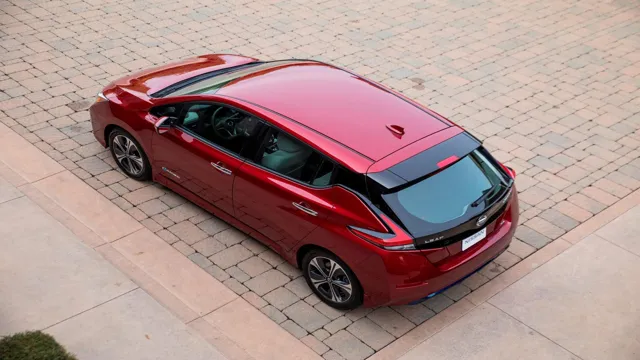
The Rise of Hybrids
The world of cars has come a long way since the invention of the automobile. In recent times, there has been a marked shift from traditional combustion engines to hybrid-electric cars. This change has been driven by the need for a more sustainable and environmentally friendly option that doesn’t compromise on performance.
Electric cars are now commonly seen on our roads, and they’re no longer just a novelty. The rise of hybrids has shown us that these cars can be practical, efficient, and even luxurious, catering to a diverse range of drivers. With increased investment and advancements in technology, the electric car industry is expected to expand rapidly in the near future.
Who knows, the next time you’re looking for a new car, you might find yourself considering an electric option.
The Birth of Modern Electric Cars
The history of modern electric cars dates back to the early 1990s, when General Motors introduced the EV1, the first mass-produced electric vehicle of its kind. The EV1 was ahead of its time with a range of up to 140 miles and a sleek design. Despite its initial success, the EV1 was discontinued in the early 2000s due to high production costs and low consumer demand.
However, this did not stop other companies from pursuing the development of electric cars. In recent years, electric car technology has advanced exponentially, leading to the production of an array of electric cars from a variety of manufacturers. With greater focus on sustainable and eco-friendly transportation, the demand for electric cars is steadily increasing, and the future looks bright for the evolution of modern electric cars.
Tesla Roadster: The Game Changer
The birth of modern electric cars can be traced back to the launch of the Tesla Roadster – a game changer in the world of automobiles. It was the first electric car that shattered the misconceptions of EVs being slow and unattractive. The design was sleek and stylish, with a top speed of 125 mph and the ability to go from 0 to 60 in just
7 seconds. The Roadster was unveiled in 2006 and became available for purchase in 2008, creating a buzz in the automobile market. It proved that electric cars can be exciting and luxurious, providing a driving experience that can rival traditional gasoline-powered cars.
The success of the Roadster paved the way for the development of other high-performance electric cars and has made electric engines mainstream. Today, the Tesla Model S, Model X, and Model 3 continue to revolutionize the automobile industry by being a leader in electric cars. This elegant invention has shown the world that electric cars are not just a dream but a reality that is here to stay, making a positive impact on the planet.
Nissan Leaf: The First Mass-Produced Electric Car
The Nissan Leaf is considered as the first mass-produced electric car in the world, paving the way for modern electric cars we see on the roads today. It was launched in 2010 and became an instant sensation, with its eco-friendly features and futuristic design. The Leaf was an innovative car, made for the environmentally conscious consumer, seeking an affordable and practical mode of transportation.
This electric vehicle could travel up to 100 miles per charge, perfect for trips around town or daily commutes. It also had the latest technology, such as a touchscreen display and navigation system, that made driving it an enjoyable experience. The Nissan Leaf set the standard for electric cars, and today, various car manufacturers have followed suit and created their own electric vehicle models.
The history of the Nissan Leaf is a testament to how one car can revolutionize an entire industry.
Chevy Volt: The Plug-in Hybrid
The Chevy Volt was certainly a revolutionary car when it hit the market in 201 It was the first plug-in hybrid vehicle with an electric range of more than 35 miles. This car was also instrumental in the revolution of modern electric cars as it challenged the status quo and paved the way for more hybrid vehicles to enter the market.
It brought the idea of a gasoline-electric hybrid powertrain a step further than ever before and showcased that it was indeed possible to create a vehicle that was efficient, affordable, and eco-friendly. Although it was initially met with skepticism, the Chevy Volt has proven to be a significant turning point in the automotive industry. Its success inspired other automakers to invest in developing similar technology and revolutionized the way that people thought about electric cars.
To this day, the Chevy Volt remains one of the most popular hybrid vehicles on the market, and it’s no surprise why. After all, it’s hard to argue with a car that’s both efficient and affordable.
Recent Advances in the Electric Car Market
The history of modern electric cars dates back to the 19th century when inventors began experimenting with electric-powered vehicles. However, it wasn’t until the early 2000s when electric cars made a comeback with the introduction of the Toyota Prius and the Tesla Roadster. Since then, several advancements have been made in the electric car market, including improved battery technology, longer driving ranges, and faster charging times.
Additionally, major car manufacturers such as Ford, Audi, and Nissan have started producing electric models, catering to the growing demand for sustainable transportation options. The future of electric cars looks promising, with innovations such as wireless charging and self-driving capabilities already being developed. As society continues to prioritize eco-friendly lifestyles, the electric car market is expected to continue its growth and transformation.
Increasing Range and Battery Efficiency
If you’re looking into buying an electric car, you might be wondering about range anxiety – the fear of running out of battery power before reaching your destination. But recent advances in the electric car market have led to significant improvements in both range and battery efficiency. Thanks to new battery technologies, electric cars are now able to travel much farther on a single charge than ever before.
In fact, some models can now drive over 300 miles on a single charge! Additionally, improvements in battery management systems that optimize energy use and reduce battery degradation have led to longer overall battery life and more efficient driving. These advancements are exciting news for anyone considering making the switch to electric, as they provide more freedom and confidence in your decision to go green.
Innovation in Design: Electric SUVs and Trucks
Innovation in the electric car market has taken a huge leap forward with the introduction of electric SUVs and trucks. These vehicles offer the convenience and space of an SUV or truck while also being environmentally friendly with zero emissions. From the sleek and stylish Tesla Model X to the impressive capabilities of the Rivian R1T truck, electric SUVs and trucks are making waves in the automotive industry.
Not only are they better for the environment, but they also offer impressive performance, with instant torque and near-silent operation. Even major car manufacturers such as Ford and GM are jumping on board, with plans to release their own electric SUVs and trucks in the near future. As the demand for eco-friendly transportation continues to grow, these innovative designs will become more commonplace on the road.
The Future of Electric Cars
The history of modern electric cars dates back to the 1990s when General Motors introduced the EV However, it wasn’t until the 2010s when electric cars began to gain traction as concerns about climate change and air pollution increased. Today, major automakers such as Tesla, Nissan, and Chevrolet produce a wide range of electric cars that offer a viable alternative to gasoline-powered vehicles.
The future of electric cars is bright, with advancements in battery technology, charging infrastructure, and renewable energy sources making electric cars more practical and affordable for the average consumer. As more people become aware of the environmental benefits and cost savings associated with electric cars, we can expect to see a continued growth in the demand for electric vehicles. Ultimately, the transition to electric cars is not only good for the environment but also for our wallets, as electric cars require less maintenance and have lower fuel costs than traditional gasoline vehicles.
Conclusion
And that, my friends, is the electrifying history of modern electric cars. From humble beginnings to becoming a mainstream mode of transportation, these energy-efficient vehicles have continuously evolved and advanced in technology. With the convenience of easy charging, lower maintenance costs, and environmentally-friendly benefits, it’s no wonder why more and more people are turning to electric cars.
So, let’s cheers to the future of sustainable transportation, one charged battery at a time!”
FAQs
What is the history behind the development of modern electric cars?
The history of modern electric cars dates back to the 1800s when scientists began experimenting with electric vehicles. However, it was not until the 1970s that modern electric cars began to emerge, and it was not until the 1990s that they became commercially available.
How do modern electric cars differ from traditional gasoline-powered cars?
Modern electric cars are powered by batteries instead of gasoline, which means that they produce zero emissions and are environmentally friendly. They also have lower operating costs and require less maintenance than traditional cars.
What are the advantages of owning a modern electric car?
Some of the advantages of owning a modern electric car include lower operating costs, increased efficiency, and zero emissions. They are also very quiet and offer smooth acceleration.
What are some of the disadvantages of owning a modern electric car?
Some of the disadvantages of owning a modern electric car include limited driving range, longer recharge times, and higher upfront costs. Additionally, there are still relatively few charging stations available, which can make long-distance travel challenging.
